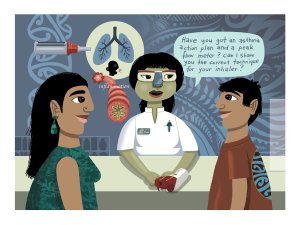Academic pharmacist Nataly Martini discusses the medical management of asthma in adults and adolescents, which has evolved to prioritise early anti-inflammatory treatment. She also explains how to improve patient outcomes by proactively identifying poor asthma control and supporting equitable access to education and treatment
Reframing ageing: Opportunities to address ageism and elder abuse

Professor Ngaire Kerse discusses how we think and talk about older people, and how it makes a difference to their wellbeing. She also highlights an under-reported problem in New Zealand – elder abuse
Kia ora and welcome to Pharmacy Today Kaitiaki Rongoā O Te Wā
Not a subscriber? Unlock this article by subscribing here.
1. Levy BR, Slade MD, Chang ES, et al. Ageism amplifies cost and prevalence of health conditions. Gerontologist 2020;60(1):174–81.
2. Chang ES, Kannoth S, Levy S, et al. Global reach of ageism on older persons' health: A systematic review. PLoS One 2020;15(1):e0220857.
3. Burnes D, Sheppard C, Henderson CR Jr, et al. Interventions to reduce ageism against older adults: A systematic review and meta-analysis. Am J Public Health 2019;109(8):e1–9.
4. Holdaway M, Wiles J, Kerse N, et al. Predictive factors for entry to long-term residential care in octogenarian Māori and non-Māori in New Zealand, LiLACS NZ cohort. BMC Public Health 2021;21(1):34.
5. Lapsley H, Kerse N, Moyes SA, et al. Do household living arrangements explain gender and ethnicity differences in receipt of support services? Findings from LiLACS NZ Māori and non-Māori advanced age cohorts. Ageing Soc 2020;40(5):1004–20.





